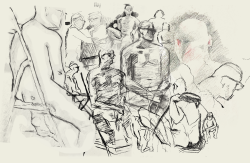When Adam Briscoe came to Georgetown in 2003, he took on the ambitious courseload typical of many SFS students, “Chinese and all that.” During high school he had been informally diagnosed with Attention Deficit Disorder by his psychiatrist, but chose to forego expensive and time-consuming diagnostic testing. Instead, he developed coping mechanisms to help him succeed academically. But by the end of his freshman year, he had “hit it like a brick wall” and was asked to withdraw from the University.
Briscoe spent two years doing human rights work in China, working for a campaign in Texas and getting a formal diagnosis for his ADD. He returned to Georgetown last year, enrolling in the College. With help from cooperative deans and understanding professors, he had two strong semesters, earning As and Bs. This year, though, his academic life fell apart again.
On Wednesday of the third week of school, he got an e-mail from his new dean, Bernie Cook, informing him that since he was only one credit shy of being a junior, the computer system had rounded up and he would have until Friday to either declare a major or withdraw. His original plan of applying for an interdisciplinary major was nixed by Cook, who said his freshman year grades pulled his GPA too low for him to qualify. Briscoe decided to declare as a Theology major because it was the one department that he was “somewhat interested in that had office hours between Wednesday and Friday.”
He ran into more problems when he was 15 minutes late for an appointment at the Student Health Center to refill his ADD medication; the Center refused to give him the refill and told him to return in four days. By that time, he was suffering from withdrawal. It took two weeks to resolve the situation, during which time he was unable to concentrate in classes and while doing work.


When he asked two of his professors if he could take their midterms orally, they agreed. According to Briscoe, the Director of the Academic Resource Center, Jane Holahan, did not. She said that he had never requested that accommodation; Briscoe said he had been trying to get the ARC to allow him to take oral exams instead of written ones for the past year, but they told him it would be too much of a burden on his professors. He failed both the midterms and the classes, and at the end of the semester was asked to withdraw from the University for the second time.
“In a lot of ways you feel that you’ve been, I don’t want to say taken advantage of, but in a way that’s what it is,” Briscoe said. “They say that they’re going to help you and that they’re going to provide the assistance necessary to succeed. And you give 100 percent and they take your money and hang you out to dry. It’s cura personalis in reverse overdrive. It’s a square peg in a round hole. And thus far the University has demanded that ADD students become round pegs and has no assistance in maybe squaring up some of their own hole-iness.”
…..
ADD is characterized by inattention, hyperactivity and impulsivity and can be manifested in a variety of ways, including distraction, intense sporadic focus and organizational and time management issues. As with many other learning disabilities, the severity of ADD varies greatly from person to person. The diversity of behavioral symptoms and the reputation for over-diagnosis has led to lingering skepticism about ADD.
“Ten years ago, no one would have acknowledged that learning disabilities exist,” SFS Associate Dean Elizabeth Andretta said. Her son had ADD and graduated from both Georgetown College and Georgetown Medical School. “Because this is a disability you can’t see, I would say there are still people, not as many as before, but there are still people who don’t get it. But they’re not in power to make the decisions.”
It’s hard to know who exactly has the power to make decisions about how Georgetown handles learning disabilities such as ADD. Professors have authority in the classroom, where most of the problems caused by ADD present themselves. Deans advise all students, including those with learning disabilities. The Academic Resource Center helps arrange academic accommodations. Counseling and Psychiatric Service (CAPS) can make diagnoses and prescribe medication. The Student Health Center fills those prescriptions.
All of these services rely on the student choosing to disclose that they have or suspect they have a learning disability. Some fear that bringing the subject up with their professors could hurt their grades.
“I don’t want to key [my professors] off to the fact that I’m not that great of a student for some reason or another,” Chelsea (COL ‘09), who did not want her last name used, said. Chelsea suspects she has ADD and has raised the subject with her doctor but has not yet been diagnosed or sought help from the University.
CAPS can diagnose ADD, but in order to qualify for many of the accommodations offered by the ARC, students must undergo formal diagnostic testing. Diagnostic testing generally costs upwards of $2,000 and consists of two or three days of rigorous examinations.
When Katherine (COL ‘11), who also requested her last name be withheld, started having academic problems, she went to CAPS. She’d had trouble getting her work done on time during high school, so when her psychiatrist at CAPS diagnosed her with ADD she was more relieved than surprised. She was put on medication and CAPS recommended that she undergo formal diagnostic testing.
The fast pace of life at Georgetown made arranging the time-intensive diagnostic test difficult. While waiting for her test, Katherine became depressed; she felt that the medication wasn’t working, that her professors’ opinions of her had changed and that CAPS was pressuring her to take a medical leave of absence. Ultimately she did take a medical leave of absence for her depression and, while at home, underwent a diagnostic test. The results showed that she does not have ADD. Regardless, she feels her experience revealed a lot about how the University treats students who do.
“It seemed that, being presented with something they don’t know how to deal with, they simply throw their hands up,” Katherine said.
CAPS Director Phil Meilman said that in thirty years of practice he had never seen a student take a medical leave of absence solely to deal with a learning disability. He also stressed that the decision to leave rests with the student.
“Often we can see academic disasters in the making even though students may be in denial of what is happening,” Meilman wrote in an e-mail. “For example, they are not attending classes, handing in work, and cannot concentrate or get out of bed. In these cases, as the semester progresses, reality often sets in and the student ultimately decides to take a medical leave.”
If a student has not yet taken a diagnostic test the ARC offers them study skills workshops, tutoring for certain introductory courses and academic advising, but they cannot request extended time for exams, note-taking services, exemptions from foreign language requirements or one of the ARC-administered study carrels on the second floor of Lauinger in the hallway that has been nicknamed “the Attention Deficit Dungeon” by students.
…..
The results of the diagnostic test take a month or two to come in and recommend very specific accommodations. Under the University’s student health insurance plan, up to $750 could be provided to help pay for the $2,000 testing, but beyond that it is up to the student’s family.
“It’s not the University’s responsibility to pay for this testing, it’s the student’s responsibility,” Holahan said. “The thing with ADD is that it is one of these items that has been over-diagnosed. There are criteria for the diagnosis of ADD. And that’s why a trained professional has to be involved in making that diagnosis.”


Holahan said her two major priorities when working with ADD students were to integrate them into the community and to make them into their own best advocates.
“You are on your own here,” Lex Benedict (COL ‘11), who is currently waiting for results from his diagnostic test, said. “In terms of a nurturing environment, I think it’s college, you know, and they let you do your own thing, which is cool.”


Once the results from diagnostic tests come in, students must seek out specific accommodations. Dennis Williams, who supervises the ARC in his position as Associate Dean of Students for the Center for Multicultural Equity and Access, said that the ARC is “not that flexible” with accommodations. Both Williams and Holahan said the ARC’s strength lies in the “personalized services” it offers, like counseling and workshops.
“All those [workshops] really do is demonstrate the fundamental misunderstanding that this University has of ADD,” Briscoe said. “It really makes it seem that they think kids with ADD are either lazy or stupid and we are, from my experience, neither.”


Some students feel that the ARC provides the bare minimum required by the Americans with Disabilities Act, and want to see an extension of their services. Benedict suggested paying for diagnostic testing; Briscoe wanted the ARC to have more flexible hours, allow oral exams and streamline the process of obtaining accommodations.
“It’s almost like Georgetown says, ‘The law says we have to provide certain services for students with disabilities so we’re going to provide them, but we’re not going to be happy about it,’” Briscoe said.
Holahan stressed that even if an accommodation is recommended by the diagnostic test and approved by the ARC, the ultimate decision rests with the professor.
“The Americans with Disabilities Act is to level the playing field, it’s not to put it in favor of someone with a disability,” she said. “Although this could be a recommended accommodation, if a professor believes it is going to compromise his or her curricular goals it does not have to be granted … Professors are the experts in their field. They have reasons why they want to give exams, why they want to give oral presentations, why they want to do research papers.”
For those professors who seek it, the Center for New Designs in Learning and Scholarship (CNDLS) offers workshops on making courses more accessible to students with diverse learning styles. They help professors develop a variety of assessment methods beyond the standard essay and multiple-choice test. They also recommend that professors include a statement in the syllabus encouraging students with learning disabilities to approach the professor and the ARC.
Barbara Craig, the Director of Assessment and Diversity for CNDLS, estimated that between 20 and 25 percent of the faculty work with CNDLS in some way over the course of a year. She said it was hard to know how many of those received training on teaching to diverse learning styles.
Students with ADD often try to take courses that complement their learning style, but many required courses are taught in a traditional lecture style.
“Occasionally there’s a class that I have to take and that is very frustrating,” Miranda White (COL ‘10), who decided to be an American Studies major in part because of the flexibility it affords her, said. “That does end up being the class I get a lower grade in. It’s almost an inevitability. I don’t give up, it does make me try harder but it’s a very frustrating experience because you just know you’re not going to do as well.”
Even with the training offered by CNDLS and efforts to handpick professors, one of the most common complaints among students with ADD is that courses consistently play to traditional learning styles, which emphasizes their weaknesses. Some suggested that this is due to the fact that professors, by definition, are people who have excelled in the traditional academic setting.
“By the time you get to the PhD, you’ve rewarded this type of learning style,” Georgetown Professor Marilyn McMorrow said. McMorrow is a professor of Government who taught Briscoe in two courses. In one course, which she had worked with CNDLS on, he was her best student; the other course, taught in a more conventional style, was one of the classes he failed.
“[Professors] are going to have the same learning style,” McMorrow said. “Then you bring them into a university where sitting in front of them is every type of learning style and it’s just natural that they’ll tend to think the people who learn the way they do are the really good students when actually it’s a form of mini-me.”
This narrow definition of intelligence frustrates many students, including White, who wishes the broader community would be more aware of the creative advantages of ADD instead of simply seeing it as a limitation.
“I’m not going to lie, I make jokes about myself all the time,” White said. “But then when other people are acting like idiots and they’re like ‘I’m acting so ADD,’ I find that insulting because I’m just like, ‘No, you’re just stupid.’ … I like the way my mind works, I like that it’s kind of off-beat. Other people might not always get it but it’s worth the struggle having it.”
…..
The overarching question is whether Georgetown is doing enough to allow students with ADD to develop their strengths and succeed.
Holahan is confident that it is; she said that between 95 and 98 percent of the ADD students she works with graduate within four years.
“I think we are offering beyond what we need to be offering because of the personalized services,” she said.
Brisoce, though, emphatically stated that the University needs to make substantial improvements.
“The fact that the University doesn’t discourage [students with ADD] from applying is ridiculous,” he said. “If you know you’re not going to be able to meet the needs of these students then don’t pretend like you will. The outcome, as it affects those students’ lives, is disastrous. It’s not a pleasant thing being kicked out of college. I know, it’s happened to me twice. I’m fine with it, it doesn’t bother me now and I’m excited for my other opportunities but I imagine [for] a lot of students going through that would just be devastating. And that’s just about as un-Jesuit as anything I can imagine.”
Most assessments fell somewhere between Holahan and Briscoe. Although troubled by the possibility that worthy students are falling by the wayside, many believe these issues are not specific to Georgetown, but rather are challenges all universities must grapple with.
“Everything is structured for the majority,” Dean Andretta said. “We seek to be inclusive but in all kinds of ways, obviously, everything in a system works the way the majority does it. So it will always be a struggle if, for whatever reason, you’re not there with the majority. That doesn’t mean you can’t be here too and we shouldn’t be doing the best we can to have you be a part of it.”





Just give these kids some communion, ten hail Mary’s and have them stop faking those disabilities. Even if they are sick provide causation not to lift a finger, like Dr. Jane Holohan says, “Why the hell should we help you? God helps those who help themselves, I mean right? Because I am a doctor and I am always right.” And Dr. Jane Holohan is always right.